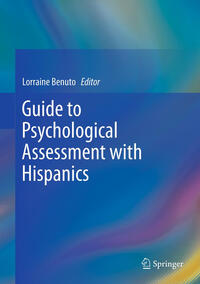
This book focuses on diversity, culture, and ethnicity as they relate to psychological assessment of Hispanics. It is a how-to guide for clinicians, researchers, and instructors working with Hispanic clients. Each chapter contains an overview of cultural considerations needed for assessing the Hispanic client followed by a specific exploration of the assessment measures available and the research that has been conducted on these measures with Hispanic participants. An exploration of the strengths and limitations of each assessment measure is included. Considering that ethnocultural minority individuals who are of Hispanic/Latino origin make up the largest ethnocultural minority group in the United States, guidelines for working with this population are a must. Given that a large subset of this percentage is composed of immigrants many of whom do not speak English or who have learned English as a second language, special considerations for effective psychological assessment are neccessary.This book fills a gap in the scientific literature by consolidating the research on psychological assessment with Hispanic samples into one comprehensive volume and providing simple recommendations for the psychological assessment of Hispanic clients. An exploration of the general psychological assessment domains (e.g., personality, intelligence) is included with references to research on the major assessment measures used in the field. A more specific exploration of psychodiagnostic assessment measures follows, including the assessment of mood disorders, anxiety disorders, sexual dysfunction, psychosis, etc. Several chapters are dedicated to specialized assessment, including neuropsychological assessment, forensic assessment, and school-based assessment, overall creating the most comprehensive, up-to-date, research-based compendium of psychological assessment measures for use with Hispanic clients.